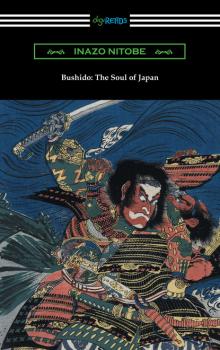ТОП просматриваемых книг сайта:
Inazo Nitobe
Список книг автора Inazo NitobeАннотация
El bushido era el código de conducta de los samuráis, la clase guerrera aristocrática que surgió durante las guerras del siglo XII, que a través de sus siete preceptos –justicia, coraje, benevolencia, cortesía, sinceridad, honor y lealtad– conforma un sistema de creencias que es único en la cultura japonesa y que permanecen vivos aún hoy en día. Este libro, a modo de guía, permite comprender, con ejemplos paralelos de la historia y la literatura europeas, porqué ciertas ideas y costumbres prevalecen en el Japón actual.
Аннотация
Bushido: The Soul of Japan is, along with Hagakure by Yamamoto Tsunetomo (1659–1719), a study of the way of the samurai. A best-seller in its day, it was read by many influential foreigners, among them President Theodore Roosevelt, President John F. Kennedy and Robert Baden-Powell, the founder of the Boy Scouts. Nitobe originally wrote Bushido: The Soul of Japan in English (1899), in Monterey, California, though according to the book's preface it was written in Malvern, Pennsylvania. The book was not translated into Japanese until it had been popular in the English-speaking world for several years. As Japan underwent deep transformations of its traditional lifestyle and military while becoming a modern nation, Nitobe engaged in an inquiry into the ethos of his nation, and the result of his meditations was this seminal work. A fine stylist in English, he wrote many books in that language, which earned him a place among the best known Japanese writers of his age. He found in Bushido, the Way of the Warrior, the sources of the seven virtues most admired by his people: rectitude, courage, benevolence, politeness, sincerity, honor and loyalty. He also delved into the other indigenous traditions of Japan, such as Buddhism, Shintoism, Confucianism and the moral guidelines handed down over hundreds of years by Japan's samurai and sages. Nitobe sought similarities and contrasts by citing the shapers of European and American thought and civilization going back to the Romans, the Greeks and Biblical times. He found a close resemblance between the samurai ethos of what he called Bushido and the spirit of medieval chivalry and the ethos of ancient Greece, as observed in books such as the Iliad of Homer.
Аннотация
Bushido which literally means «Way of the Warrior» is a code that has greatly influenced the culture and people of Japan. Developed in Japan between the Heian and Tokugawa ages (9th – 12th century) Bushido was the code of the Samurai. In «Bushido: The Soul of Japan» Inazo Nitobe explores how the influence of the ancient code of Bushido has had such a lasting effect on the culture and traditions of Japan.
Аннотация
Bushido, which literally means “the way of warriors” is a code of conduct, based upon a set of honors and ideals associated with the samurai way of life, that has greatly influenced the culture and people of Japan. The origin of bushido likely dates to sometime between the 16th and 20th century in Japan, though some scholars argue that it may have been built upon much earlier traditions. Born from the Neo-Confucianism of the Edo period, bushido emphasizes the eight virtues of righteousness, heroism, compassion, respect, honesty, honor, loyalty, and self-control. Noted diplomat, statesman, economist, educator, and author, Inazo Nitobe helped to introduce the culture of Japan to a western audience. Today he is best remembered for his work “Bushido: The Soul of Japan”. First published in English in 1900, the work explores how the influence of the ancient code of bushido has had such a lasting effect on the culture and traditions of Japan. Drawing in the eastern traditions of Buddhism, Shintoism, and Confucianism, Nitobe compares and contrasts bushido with the foundations of Western culture finding common ground in the spirit of medieval chivalry and the ethos of ancient Greece. While criticized in Japan contemporarily for presenting bushido from too Western of a perspective, the work is today recognized as a classic on the subject. This edition includes an introduction by William Elliot Griffis.
Аннотация
Japanese Bushido has played a major role in shaping modern Japanese society as well as the various modern Japanese martial arts within Japan and internationally. Bushido: The Classic Portrait of Samurai Martial Culture written by Inazo Nitobe, one of Japan's foremost scholars, thoroughly explores each of these values and explains how they differ from their western counterparts. First published in 1905 as Bushido: The Soul of Japan , this samurai guide reveals the very essence of samurai warriors and Japanese culture and represents one of the most popular and authentic depictions of Japanese samurai philosophy.Chapters include: Bushido as an Ethical SystemSources of BushidoHonorThe Education and Training of a SamuraiSelf-ControlThe Influence of BushidoThe Future of Bushido






